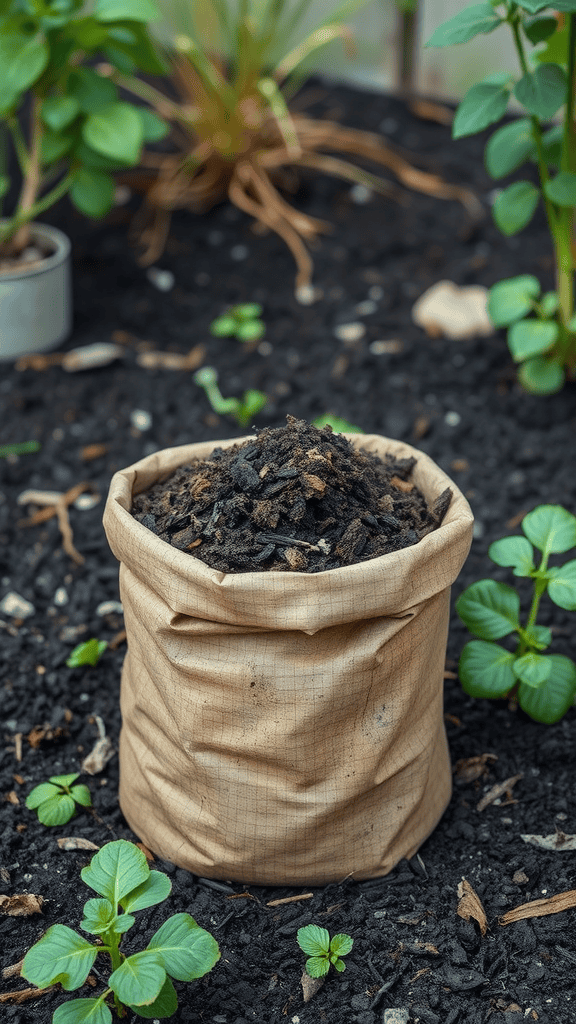Effective Methods for Using Compost in Your Yard
Using compost in your yard is one of the most effective ways to promote healthy soil and foster an abundant garden. Compost enriches the soil, provides essential nutrients for plants, and encourages beneficial microorganisms. Here are some effective methods for using compost in your yard.
Compost into Garden Beds
One of the easiest ways to use compost is by mixing it directly into your garden soil. Here’s how you can do it:
- Start with Healthy Soil: Before adding compost, ensure your garden beds are free from weeds and rocks.
- Combine evenly: Spread a layer of compost, about 2 to 4 inches thick, over your garden beds.
- Till it In: Use a garden fork or tiller to mix compost into the top 6 to 8 inches of soil.
This method helps improve soil structure, promoting water retention and improving drainage. The nutrients in the compost will slowly become available to your plants, giving them a healthy boost.
Creating Compost Tea for Fertilization
Compost tea is a nutrient-rich liquid that is perfect for fertilizing your plants. To make compost tea, follow these steps:
- Gather Materials: You will need a bucket, water, and finished compost.
- Mix: Fill the bucket halfway with compost and fill it with water. Stir well to mix.
- Let it Steep: Allow the mixture to sit for 24 to 48 hours, stirring occasionally.
- Strain: Use a cheesecloth or fine mesh to strain the liquid into another container.
You can apply this tea directly to your plants or use it as a foliar spray. It acts as an effective fertilizer and helps strengthen plants against diseases.
Using Compost as Mulch
Another effective method is to use compost as mulch. Applying a layer of compost on the soil surface offers numerous benefits:
- Suppresses weeds by blocking sunlight.
- Helps retain moisture in the soil.
- Gradually breaks down, enriching the soil below.
To apply compost as mulch:
- Spread it Out: Apply a 1 to 2-inch layer around plants and over bare soil.
- Keep Away from Stems: Ensure that the compost does not touch plant stems to prevent rot.
Improving Lawn Health with Compost
Compost can also improve the health of your lawn. Here’s how to incorporate compost into your yard:
- Topdressing: Spread a thin layer (1/4 to 1/2 inch) of compost over your lawn.
- Use a Rake: Use a rake to help distribute the compost evenly.
- Watering: Water lightly to help the compost settle into the soil.
This approach not only feeds the grass but also enhances soil structure, making it easier for roots to access nutrients.
Restoring Soil with Compost for New Plantings
When planting new trees, shrubs, or flowers, adding compost can help establish their roots more efficiently. Here’s what you can do:
- Dig the Hole: Prepare the planting hole as per usual.
- Add Compost: Mix compost with the native soil in a ratio of about 1:1.
- Plant: Place your plant in the hole and backfill with the soil-compost mixture.
This technique helps the plant thrive by providing an immediate source of nutrients.
Composting in Raised Beds
If you have raised garden beds, consider creating a compost layer at the bottom. Here’s how to do it:
- Layer It Up: Place coarse compost materials like branches and straw at the bottom.
- Add Soil: Top it with good-quality soil and compost blend.
This strategy improves drainage and provides a sufficient nutrient supply as the compost breaks down over time.
By employing these effective compost methods, you can significantly enhance the health and beauty of your yard. From enriching soil to improving plant vitality, compost is your ticket to a thriving garden. Remember, regular application of compost keeps your plants healthy and your soil vibrant. Happy gardening!
The Benefits of Composting for Sustainable Gardening Practices
Composting transforms organic waste into a rich, nutrient-dense soil amendment. This process plays a crucial role in sustainable gardening practices, benefiting both the environment and your garden. By embracing composting, you take a significant step toward creating a healthier ecosystem right in your backyard.
When you use compost, you engage in a circular economy, where waste is reused, reducing landfill dependency. Instead of discarding kitchen scraps, yard trimmings, and other organic materials, you can turn them into a resource. This not only minimizes waste but also helps reduce greenhouse gas emissions from landfills, making composting an eco-friendly choice.
Improving Soil Health
One of the most significant advantages of composting is its ability to improve soil structure. By adding compost to your garden, you enhance both the physical and biological properties of the soil. Here’s how:
- Enhances Moisture Retention: Compost helps the soil retain water, making it easier for plants to access moisture during dry spells.
- Boosts Nutrients: Rich in essential nutrients, compost nourishes your plants, helping them grow strong and healthy.
- Encourages Microbial Activity: Compost is teeming with beneficial microorganisms that improve soil fertility and structure, promoting a balanced ecosystem.
Reducing Chemical Fertilizer Dependency
Many gardeners rely on chemical fertilizers to maintain soil fertility. However, using compost can reduce this dependency significantly. Compost provides a slow-release source of nutrients that supports plant growth throughout the season. This minimizes the need for chemical fertilizers, which can pollute waterways and harm beneficial soil organisms.
Enhancing Plant Growth
Plants flourish in nutrient-rich soil. By applying compost, you supply these essential nutrients in a form that’s easily accessible to them. Here’s how compost enhances plant growth:
- Stronger Roots: The nutrients in compost promote strong root development, allowing plants to absorb water and nutrients more efficiently.
- Increased Disease Resistance: Healthy soil leads to healthy plants, making them more resistant to pests and diseases.
- Better Yield: Gardens enriched with compost generally produce more abundant and higher-quality crops.
Encouraging Sustainable Practices
Composting teaches valuable lessons in sustainability. It encourages you to think about waste, resource management, and environmental impact. By composting, you become more aware of what you throw away, promoting smarter consumption habits. You’ll likely produce less waste overall, making your household more sustainable.
Supporting Biodiversity
A thriving garden is a biodiversity hotspot. Composting enhances this by supporting a variety of organisms, including earthworms, beneficial bacteria, and fungi. When you add compost to your garden, you create an ideal habitat for these organisms that contribute to soil health. Biodiversity in your garden can lead to:
- Natural Pest Control: A diverse ecosystem means more natural predators for pests, reducing the need for chemical pesticides.
- Improved Pollination: Attracting a variety of insects and animals aids in pollination, increasing both flowering and fruiting.
Being Cost-Effective
Another compelling benefit of composting is the potential cost savings. While there may be some initial investment in creating a composting system, the long-term savings are significant. By producing your own compost, you reduce the need to buy fertilizers and soil amendments. Plus, you’ll save money on waste disposal since you’re recycling organic matter instead. Over time, your garden will provide a bountiful harvest that offsets these initial costs.
Composting into your gardening practices offers numerous benefits. From improving soil health to supporting biodiversity, this process fosters a sustainable approach to gardening. Plus, by embracing composting, you become an active participant in waste reduction and environmental stewardship. Why not start your composting journey today? Your garden, the environment, and your wallet will thank you.
Conclusion
Using compost in your yard is a simple yet powerful way to enhance your gardening efforts while promoting sustainability. By implementing effective methods such as incorporating compost into garden beds, using it as a top dressing for lawns, or adding it to potting mixes, you can significantly improve soil health and boost plant growth. These practices not only enrich your garden but also encourage biodiversity, reduce waste, and minimize the need for chemical fertilizers.
The benefits of composting extend far beyond just enriching the soil. Through composting, you can recycle organic waste, turning what would usually end up in a landfill into a valuable resource. This process contributes to healthier ecosystems by reducing greenhouse gas emissions and promoting soil structure and water retention. As you witness the transformation of your yard into a thriving, vibrant space, you’ll feel a sense of accomplishment knowing that your efforts are contributing to a greener planet.
Compost into your gardening practices is not just an environmental decision; it’s a commitment to sustainable living. By choosing to compost, you play an integral role in fostering healthier soil, boosting plant vitality, and lessening your environmental footprint. So, whether you’re an experienced gardener or just starting, making compost a part of your yard care routine will yield a wealth of benefits for both you and the earth. Embrace this eco-friendly practice today and watch as your yard flourishes in ways you never thought possible.
As an Amazon Associate, I earn from qualifying purchases.

